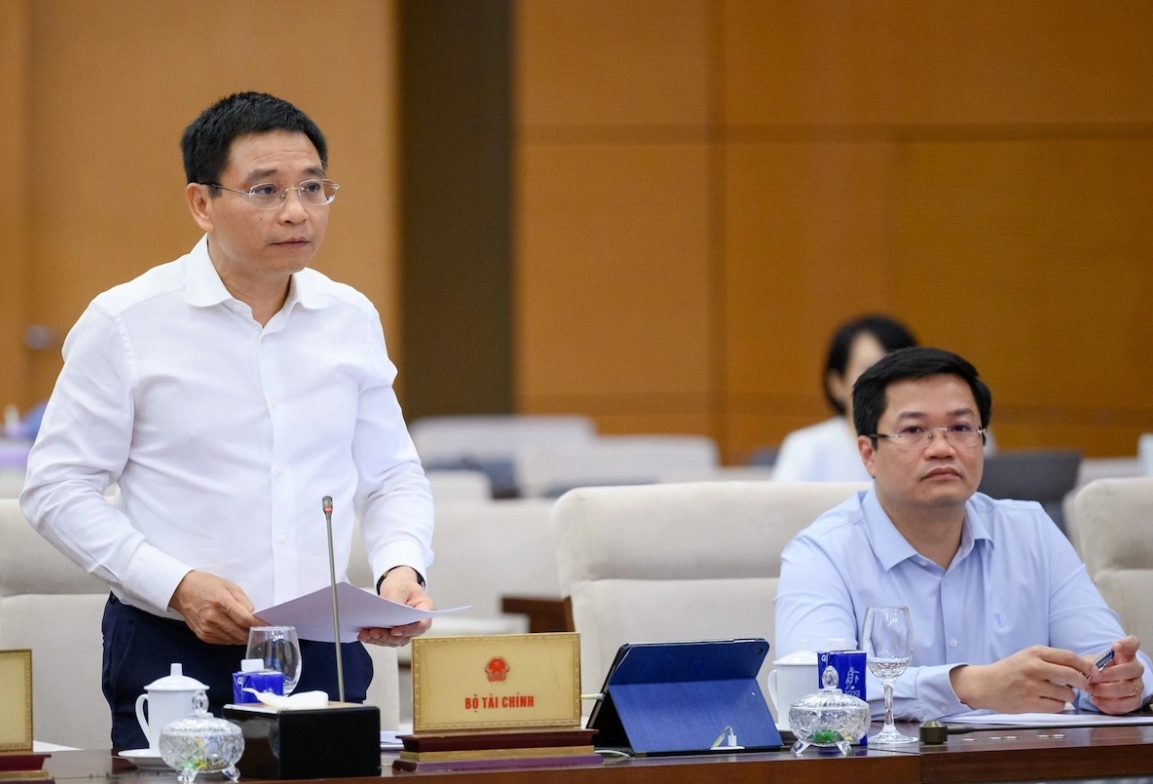Vietnam to tighten management of corporate bond issuance
The move is expected to push enterprises to maintain safer financial leverage when raising capital via bonds
Companies may issue private bonds only if their total liabilities do not exceed five times their equity, as stated in a draft amendment to the Law on Enterprises.

Minister of Finance Nguyen Van Thang at the 44th meeting of the National Assembly Standing Committee on April 25. Photo: quochoi.vn
This provision was discussed by National Assembly deputies at the 44th meeting of the National Assembly Standing Committee on April 25 as part of deliberations on revisions to the Law on Enterprises. The latest draft introduces stricter regulations on private corporate bond issuance in response to recent market risks.
According to the draft, a company may issue private bonds only if its total liabilities do not exceed five times its equity, based on the most recent financial statement. This condition does not apply to state-owned enterprises, entities issuing bonds to finance real estate projects, banks, insurance companies, insurance brokers, securities companies or investment fund managers.
In reviewing the proposal, Phan Van Mai, Chairman of the Economic and Financial Committee, asked the government to clarify the rationale and potential impact of this cap on bond issuers.
In fact, this debt-to-equity ratio requirement had already been introduced under Decree 81/2020. Tran Van Khai, a full-time member of the Committee on Science, Technology, and Environment, noted that this threshold had helped curb excessive bond issuance by undercapitalized firms, some of which had issued bonds with outstanding amounts 50 to 100 times their equity.
Khai emphasized that the inclusion of the 5x debt-to-equity cap in the amended law would enhance legal enforceability. "This will encourage companies to maintain a safer financial leverage when raising capital through bonds," he said.
However, Khai warned of implementation challenges and market impact. Many firms, especially in the property and construction sectors, have higher debt ratios, and if they are barred from issuing bonds, they could lose an important source of funding, affecting their operations and ability to repay debt.
"After the recent tightening, corporate bond issuance volumes fell significantly and the market became sluggish. A phased implementation of the new rule is needed to avoid market shocks," he added.
The private bond market remained subdued for most of 2023 following regulatory crackdowns. However, it showed signs of recovery last year, with total issuance reaching VND444 trillion ($17.04 billion) - up 27% year-on-year. By the end of February this year, companies had issued over VND5.55 trillion ($213 million) worth of bonds, although there were no issues in February, according to the Vietnam Bond Market Association (VBMA). Still, analysts expect double-digit growth in 2024.
Vice Chairwoman of the Committee on Judicial Affairs Le Thi Nga suggested further clarification on the financial capacity requirements for bond issuers. She argued that the rule may disadvantage large enterprises, which often have higher debt ratios than smaller ones.

The government is tightening the issuance of corporate bonds. File Photo
Additionally, the Economic and Financial Committee recommended that the drafting body, the Ministry of Finance, consider expanding access to private bonds issued by joint-stock companies that are not public companies, including individual investors (with limits on the number of investors). This could broaden the sources of financing for companies, when market conditions permit, and contribute to the sustainable development of the bond market.
On this point, Khai noted that private bonds are currently limited to professional investors, which inhibits demand. To balance risk and capital needs, the Committee on Science, Technology and the Environment suggested expanding the pool of eligible investors. Protective conditions for retail investors could include independent credit ratings for issuers, collateralized bonds, and payment guarantees from banks. Conditional access would allow companies to raise capital more efficiently while protecting less sophisticated investors.
"Tighter regulation of private bond issuance is necessary to ensure a healthier capital market," Khai said. "However, the government must carefully assess the potential impact and strike a balance between risk management and supporting capital mobilization to avoid excessive tightening that could hinder capital flows in the economy."
In a subsequent response, Minister of Finance Nguyen Van Thang said the proposed conditions for private bond issuance aim to align with the amended Securities Law. He stressed that bonds are inherently risky financial instruments that are only suitable for investors with the ability and knowledge to analyze investment risks. Therefore, imposing issuance conditions is essential to mitigate payment risks.
Regarding the five times debt-to-equity ratio, Thang described it as a prudent threshold that already excludes certain types of issuers. He noted that this ratio is similar to the requirement for companies launching an initial public offering (IPO), so it should not unduly burden companies. The draft amendment also includes provisions on beneficial ownership to comply with the 2022 Anti-Money Laundering Law and international recommendations.
Specifically, a beneficial owner is defined as an individual who directly or indirectly owns at least 25% of charter capital, receives more than 25% of the profits of the company, or ultimately controls the company.
Khai pointed out that this percentage-based definition is in line with international corporate governance practices and helps promote transparency and prevent hidden ownership. However, he noted that the Anti-Money Laundering Law 2022 provides a broader definition that focuses on individuals who have de facto ownership or control in asset transactions.
"This means that someone who benefits economically from a company but does not control it may not qualify as a beneficial owner under the spirit of the anti-money laundering law," he said, urging the drafting body to review and harmonize the criteria for consistency with existing laws.
Similarly, Chairman of the Economic and Financial Committee Phan Van Mai, said that the definition of beneficial ownership should avoid imposing unnecessary burdens on enterprises, which have to comply with different reporting requirements under both Law on Anti-Money Laundering and Law on Enterprises.
The review panel also suggested that the government re-evaluate the requirements for collecting, storing, and providing beneficial ownership information. These rules should be workable, support administrative reform, improve the business environment, and reduce compliance costs for companies.
The draft amendments to the Law on Enterprises will be submitted to the National Assembly for consideration at the session in May.








